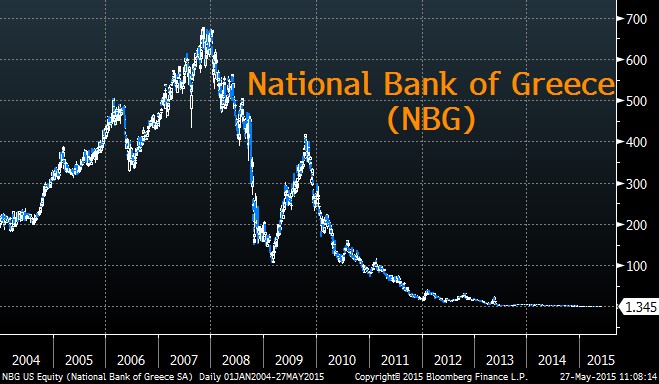Click Here for this Week's Full Letter - May 28, 2015
Greetings,
It’s fair to say that Greece is now essentially a third world country. Since its first bailout in 2010, the Greek government has been forced to cut spending by $30 billion - a sizable amount for a $195 billion economy. That’s the equivalent of a $2.6 trillion cut to the US budget. In Greece, the trash is being collected but that’s pretty much the only public service in operation. Hospitals and schools are prohibited from hiring, even though the unemployment rate is above 25%.
Unfortunately, it looks like the situation might deteriorate even further from here. On June 8, one of several IMF loans will be due and Greece’s cash deficit will quadruple. It’s conceivable that the EU could step in and grant further concessions, but German Chancellor Merkel said that “greater [austerity] efforts were needed” last Friday. This could be the end of the road for Greece, which has suffered under austerity for over five years. The European commission is preparing contingency plans for the Greek banking system in case a new bailout agreement can’t be reached. A “Grexit” from the Eurozone won’t have systemic implications because its economy is so small. Regulators are more worried about precedent in case a systemically important country like Spain heads for the exit. It’s hard to think about financial opportunities in what could turn out to be a humanitarian crisis, but as the benevolent Rahm Emanuel once said, “Never let a crisis go to waste.” If the Eurozone allows Greece to file the sovereign equivalent of Chapter 11, their first priority should be to rehabilitate the banking system. This would be much easier to accomplish if the Greek Drachma was reinstated as the local currency. German Finance Minister Schauble already mentioned the possibility that Greece may need a parallel currency alongside the euro if talks fails.
A devalued currency would allow banks to be recapitalized, which is desperately needed. The National Bank of Greece (NBG) is wholly dependent on the ECB and Bank of Greece for funding at the moment – meaning it’s entirely shut out from capital markets. Many believe a Greek default wouldn’t ignite a bank run because so many funds have already left the country.
In fact, owning shares of NBG before a potential default seems to offer decent risk/reward. Shares already trade as though the company is bankrupt, but the introduction of a weaker currency could inject animal spirits into Greece’s moribund economy. Interestingly, short interest in NBG dropped 45% between April 15 and April 30. The future is too murky for distressed investors to build major positions, but the market is well-aware of the potential for a squeeze higher. It’s a risky investment and it should be treated like a call option, one that Greek citizens hope is exercised.
The Cup & Handle Fund is still up about 1.0% on the year, and +15.5% since August (inception). I turned bearish on the Yen last week and went short in a big way, which has helped offset some losses in unrelated positions. My investment picks for May are still rallying on little news, implying further gains to come. If you’d like to start receiving these letters click here.
Today’s letter will cover several topics, including:
- The Fundamentals of Stocks
- Timing a Bubble
- The Danger of Illiquidity
- Chart of the Week
With that I give you this week's letter:
May 28, 2015
As always, if you have any questions or comments or just want to vent, please send me an email at mike@cup-handle.com.
Until next time, tread lightly out there,
Michael Lingenheld
Managing Editor – Cup & Handle Macro
Recent free content from Michael Lingenheld
-
 The Finale - April 21, 2016
— 4/20/16
The Finale - April 21, 2016
— 4/20/16
-
 The Spring Freeze - April 6, 2016
— 4/05/16
The Spring Freeze - April 6, 2016
— 4/05/16
-
 Dependent on Friday's Data - March 30, 2016
— 3/29/16
Dependent on Friday's Data - March 30, 2016
— 3/29/16
-
 Money For Less Than Nothing - March 23, 2016
— 3/22/16
Money For Less Than Nothing - March 23, 2016
— 3/22/16
-
 Avoid the Crowds - March 16, 2016
— 3/15/16
Avoid the Crowds - March 16, 2016
— 3/15/16
-
{[comment.author.username]} {[comment.author.username]} — Marketfy Staff — Maven — Member


